- Accidents and Incidents
- Posts
- I Went To A Quarry For Shakespeare And Cried Over Dead Trucks
I Went To A Quarry For Shakespeare And Cried Over Dead Trucks
I might be a little in love with an excavator.
Last week, I saw Romeo and Juliet performed by heavy machinery behind a flooded Estonian quarry. Yes, it was amazing. No, you can’t.
I expected a spectacle. Here’s the blurb for this production of Romula ja Julia that hooked me:
The performance features “excavators, a front-end loader, a concrete mixer, a fire truck, city buses and other large machinery,” with “the role of Julia played by a red Ford Ranger 4×4 pickup truck making its stage debut.
I did not mean to care about two shiny trucks. And yet, here we are.
The show ended shortly after the last bus from to Keila, let alone a bus that would get me home. Local accommodation was 150€/night. But Rummu Quarry has a small caravan and campsite. I arrived early with my trusty blue tent, which which has been gathering dust in the closet for the past three years.
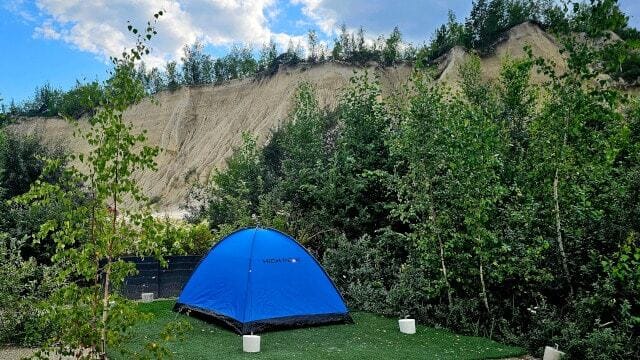
The drowned quarry glowed turquoise in the shadow of a birch‑capped ash hill. I swam around the ruined buildings and sat on the quarry beach. Finally, only slightly sunburned in the Estonian evening sun, I crawled into my tent to twist myself into something-approaching-formal-wear ready for the show.
“It’s basically a big experiment about what it means to do Shakespeare today and whether we can find new ways to do it,” the co-director said to ERR news, which described it as a demolition derby version of Romeo and Juliet.
In case we still didn’t get it, a tractor was parked in the sand behind the food truck offering spritzes with your choice of Aperol, Campari, or unnamed gin.
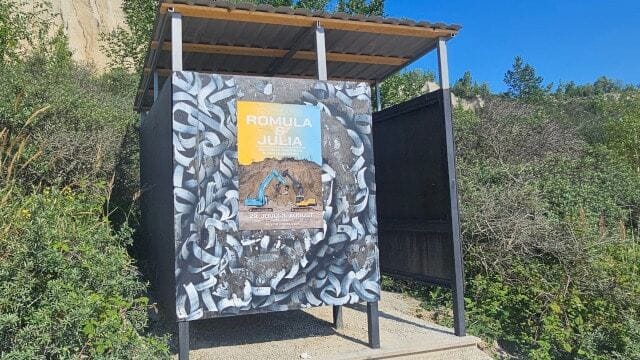
The gin was surprisingly good, all things considered. Stagehands formed an oddly polite blockade, guarding access to the dirt trail that wrapped around the ash hill.
When they finally waved us through, the crowd shuffled past an impressive amount of heavy machinery to tiered scaffolding that trembled alarmingly as we climbed up to our seats. The “stage” stretched before us: a barren patch of Estonian dirt. This was either the most honest production ever or the most pretentious, depending on whether you’ve had enough gin.
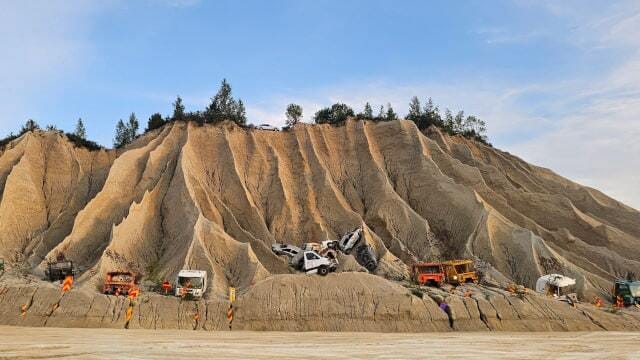
The production started with a construction sign informing us that this was the prologue with an excavator (Mercutio) and a hydraulic hammer (Tybalt) squaring off in the middle of the construction site. After much hostile posturing, the hydraulic hammer drew a line in the sand, daring the excavator to cross it. The excavator definitely had a look of “lol OK” as it picked up a large shovelful of sand and rolled forward just close enough that it could drop the dirt on the other side of the line. The tension peaked. A car parked up high wobbled and then fell, sliding down a steep cliff and crashing into a heap. A piece of machinery was brutally slain. The driver got out, abandoning it on the spot. We watched the man in a high-vis vest walk slowly up the hill and out of sight.
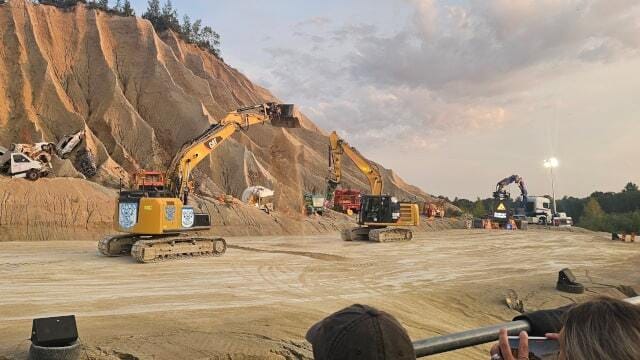
Never have I felt the animosity between the Capulets and the Montagues quite so intensely. Sorry, the Carburetti and the Motoretti, for those were the two houses of this engine-obsessed edition. I found myself leaning in so as not to miss a thing.
The production expects you to know at least the basics of the story, although there were plenty of young children in the audience who knew nothing of the plot and were just there to watch the trucks in the dirt. They were not disappointed.
This was more than just noise and diesel fumes; this was storytelling. It was impossible not to fall in love with the star-crossed lovers at the ball. Juliet, fetching in candy-apple red, rolled in like she owned the quarry. Romeo, a rough-and-ready rally truck with flames on the side, drove around the heavy machinery to meet her. The adrenaline of success had Romeo driving donuts in the dirt with his music blasting from the cab. Juliet appeared at the top of a tall cliff, flashing her lights to get Romeo’s attention. She parked there, looking down at us, as operatic music played through large loudspeakers. This was the balcony scene.
Of course, the hydraulic hammer had been spoiling for a fight all evening. The duel scene was frankly terrifying. The excavator and a hydraulic hammer came to blows, metal upon metal, while a hot-rod truck drove in frantic circles around them. Fireworks burst in the background. Picture a crime scene where the murder weapon is the size of a house and still running. And then the deaths. We all went silent as two large men climbed out of their vehicles, abandoning them to walk up the hill in the setting sunlight. A compact loader drove onto the scene, picking up dirt and tossing it onto the metal treads of the two incapacitated giants.
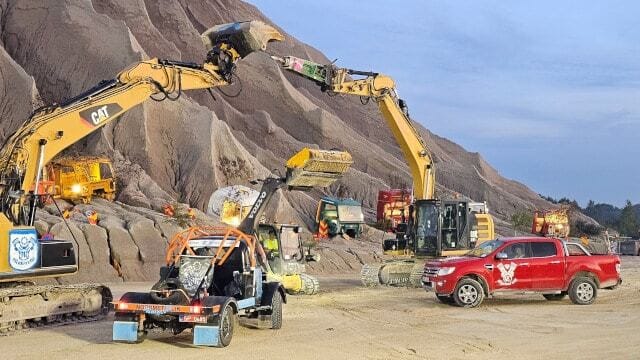
Romeo and Juliet rolled in and parked facing the compact loader, which bobbed up and down in front of them. I blinked as it finally sank in that it was the priest. This was the wedding and we were all witnesses.
The two truck drivers climbed out and tied tin cans to their rear bumpers, painted pink with red hearts. They drove around the stage in wide, lazy circles, tin cans trailing behind them. We applauded happily as they retreated to the far right of the stage, a relatively secluded corner next to some large machinery.
A cement mixer pulled out in front of them, obscuring the newlyweds from our view. The cement mixer started turning its turny thingie (technical term) which had been spray-painted with cotton-candy pink hearts for the occasion.
The cement mixer just stood there, turning, as the audience began laughing.
Then, in case we still didn’t get it, a large blue piece of machinery extended a telescopic boom up into the air, straight up and up and up, ten stories high and still growing. The adults screamed with laughter while their children (just there to see a motor rally!) looked around very confused.
The cement mixer withdrew as a fire engine came screaming in, lights flashing, blasting Romeo with water. The lovers were ripped apart as Romeo gunned it and fish-tailed away. He peeled across the stage, chased by the fire engine until he disappeared up the hill, banished. I noticed that the blue boom was still extended (poor Romeo).
I promise you, it was the most romantic and explicit sex scene between two trucks that I could ever have imagined. This is not a sentence I ever expected to say.
A tiny remote control truck zipped across the stage, weaving and dodging under heavy machinery and around the angry fire engine. I’m not sure how it avoided getting crushed but I do know that it failed to get its message to Romeo.
By now, the sun was setting. Headlamps became stage lights. The quarry shifted from gold to grey-blue as the story darkened.
Juliet pulled up in front of the audience. The driver got out and poured fluid into her radiator. He left the hood up as he returned to the driver’s side and disappeared from our sight. Then the truck’s alarm kicked off, honking and lights flashing, as the Carburetti gathered and surrounded the stricken 4×4.
Romeo the rally truck returned, circling poor Juliet and then slowly parked next to her. The driver popped the hood and got out, pouring the fatal poison into the engine. But instead of going back to the open driver’s side door, he walked away from the truck, across the stage. Sudden movement drew our attention back to the two broken-down vehicles: Juliet’s driver stared at the rally truck, then at its driver walking away in the fading dusky light. He ran across the stage, sprinting after him. And then they both trudged up the hill together, the trucks abandoned with their hoods up.
IT WAS DEVASTATING.
I was not expecting to have my heart broken.
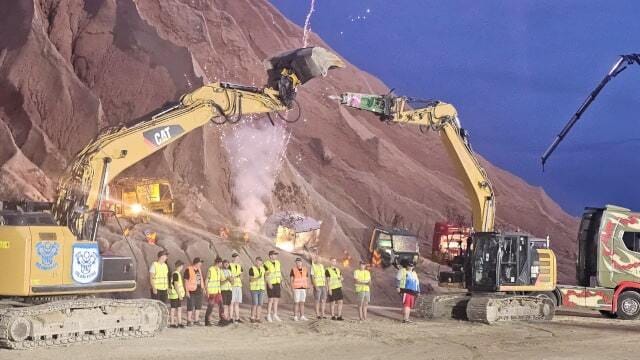
The audience, some 750 people herded onto temporary bleachers, gave a standing ovation while a crowd of construction workers took to the center of the dirt lot and bowed as fireworks went off into the darkness. I wanted to throw flowers. I wanted to run down and hug them for having put on such an amazing and unbelievable performance.
The following morning, having survived a thunderstorm in a tent that turned out not to be waterproof, I climbed up the ridge of the ash hill to look down at the stage. It looked like a pit-crew apocalypse as they dismantled the set. Juliet was there, her truck bed filled with pieces of bleachers. Romeo, surprising no one, was nowhere to be seen.
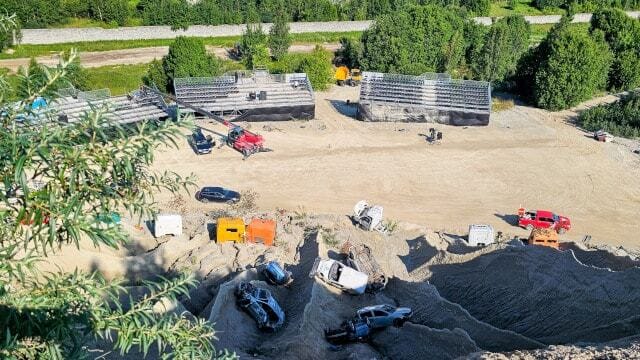
I couldn’t get over the idea that someone had this idea and just somehow…made it happen. Someone kept saying yes to this ridiculous idea of Verona in sand and steel, a show that could only happen here, only now, only like this.
If they ever stage the production again, I will be there, evangelizing to strangers, dragging everyone I know to the quarry until they, too, are crying over a candy-apple red 4×4 with tin cans tied to its bumper. This wasn’t a demolition derby, it wasn’t “just” theater; it was the kind of experience that makes me believe in art again. Raw, joyful, impossible visions, bulldozed into existence.
